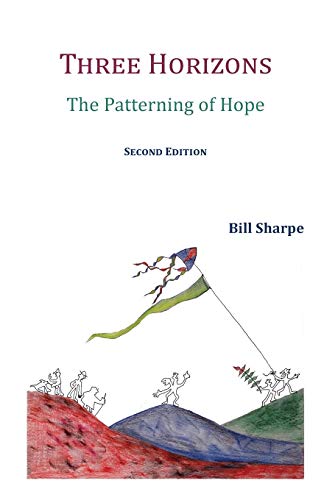Inhaltsangabe:
Three Horizons is a simple, intuitive framework for thinking about the future. But it is about much more than simply stretching our thinking to embrace the short, medium and long term. Three Horizons is a prompt for developing a ‘future consciousness’ – a rich, multi-faceted awareness of the future potential of the present moment.
This book explores how to put that awareness to work, so we can create the futures we aspire to. It first outlines the Three Horizons framework and practices, including case studies of its application in community development, education and healthcare. The final section explores Bill Sharpe’s intuition “that we have... a far deeper capacity for shared life than we are using, and that we are suffering from an attempt to know our way into the future instead of live our way”. Here he outlines the potential of future consciousness as a shared cultural practice to guide society towards a third horizon that is the patterning of our mutual hopes.
Bill was previously a Research Director at Hewlett-Packard's corporate labs in Bristol, UK. He joined HP Laboratories in 1985, becoming one of the first HP Laboratory Directors outside the US. Early work in Bristol provided the impetus for him to set up the Personal Systems Lab that led HP's early work in the emerging world of smart consumer products, mobile computing and digital imaging. Bill then took an assignment in the USA for two years to lead the Internet Solutions Operation of HP's Laserjet Business through the transition to Web. Back in Bristol Bill set up new mechanisms for coupling HP Labs to the creation of HP's new information appliance businesses. This work led him to co-found the Appliance Studio in 1999 as an independent company, delivering innovation to a wider commercial audience. Having created a range of new product ideas for clients, in particular new business in digital signage for Steelcase Inc (www.wizardwebsigns.com), the Studio launched its own start-up Lucid Signs. With the sale of Lucid Signs Bill moved on to focus entirely on personal research and consulting. Early in his career, Bill took an active role in UK government research through his work with the Science and Engineering Research Council (SERC) and Advanced IT (Alvey) programs. As a member of the Programme Directorate at Alvey - a programme designed to foster R&D between industry and academia - Bill co- coordinated research into intelligent knowledge-based systems. Bill received a MA in Natural Sciences at Cambridge University, England, specialising in Maths, Physics and Experimental Psychology. He earned an MTech in Computer Science from Brunel University.
Jennifer Williams is an American artist based in London, UK where, in 1977, she founded the Centre for Creative Communities (CCC). As well as the CCC work, Jennifer works as a freelance artist and as a specialist in social change processes. Jennifer's interest in IFF is in collaborative projects that link learning with creative practice, social inclusion and community development. Besides maintaining an active schedule of public speaking and writing for journals, in recent years she has developed a specialist role as artist-in-residence at conferences, courses and extended processes such as Glasgow's Civic Conversation. Jennifer has written books on topics including cultural exchange, the arts and urban regeneration and cross sector collaboration. Jennifer's artwork, mainly visual, ranges from hand made books, cutouts, photography, illustration and printmaking to the making of masks. Prior to moving to the UK, Jennifer ran a touring puppet theatre known as Williams Toy Theatre, which was awarded a number of distinctions from the international puppet community.
„Über diesen Titel“ kann sich auf eine andere Ausgabe dieses Titels beziehen.
![]()
